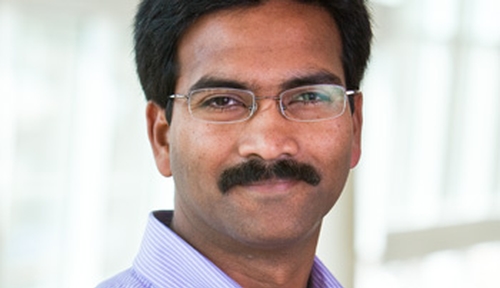Imagine asking a question and getting 30,000 answers coming at you like water from a fire hose.
How would you sort through all that information and find the one answer you’re looking for?
Babu Guda, Ph.D., an associate professor in the department of genetics, cell biology and anatomy at UNMC, knows how.
Enlist the help of a computational biologist who runs a data coordination center and can categorize, sift through and bring some sense of order to all that information. As director of the Bioinformatics and Systems Biology Core Facility and as the principal investigator of a National Institutes of Health-funded computational biology lab, Dr. Guda is well versed in how to help researchers find what they are looking for when it comes to data.
“Data output from biology experiments has exploded in the past 10 years,” Dr. Guda said. “Before, people worked with one gene and generated a small amount of data, but now with advances in technology they are getting results they can’t possibly analyze manually.”
With a background in molecular biology combined with formal training in computer science, Dr. Guda is uniquely positioned to help researchers weed through the plethora of data generated.
“We are not looking for a needle in a haystack; rather we are looking for pieces of a needle in a haystack that we hope to use to assemble the needle,” Dr. Guda said. “Finding all the pieces of the needle is our biggest challenge.”
Dr. Guda has collaborated on several projects at UNMC, including the Nebraska BioBank led by Jennifer Larsen, M.D., vice chancellor for research; the National Neuro Aids Tissue Consortium — Data Coordination Center led by Howard Fox, M.D., Ph.D., senior associate dean for research in the UNMC College of Medicine; and the Agendia pilot project on breast cancer genomics led by Ken Cowan, M.D., Ph.D., director of the Fred & Pamela Buffett Cancer Center and the Eppley Institute.
In addition, his group collaborates on scores of research projects led by individual researchers from different clinical and basic science departments.
“We give investigators an understanding of their data by helping them formulate the right questions that draw out what they are looking for in their research,” Dr. Guda said.
Dr. Guda came to UNMC in 2010 from SUNY at Albany in New York to start the core facility. Since then, he has collaborated with numerous investigators on a variety of projects from neuroscience to cancer research to analyzing the rapid autopsy pancreatic cancer data with Tony Hollingsworth, Ph.D., professor and director of pancreatic cancer research in the Eppley Institute.
He works with Dr. Hollingsworth to identify patterns in the cancer genomes that are unique to pre-metastatic conditions compared to metastatic conditions in pancreatic cancer patients.
“We look at the complete exome of one patient, mapping the affected genes in premetastatic and metastatic samples and see exactly which genes are differently altered in each stage and the effect these alterations have on the cell in relationship to the progression of the cancer,” Dr. Guda said.
One of the goals of this type of research is providing the researcher computational tools that helps them identify the specific subtypes of a cancer (applicable to most of the cancers), which will help lead to individualized medicine, and directed drug therapy, he said.
“If we could meet these goals, it’s personalized medicine at its finest.”
